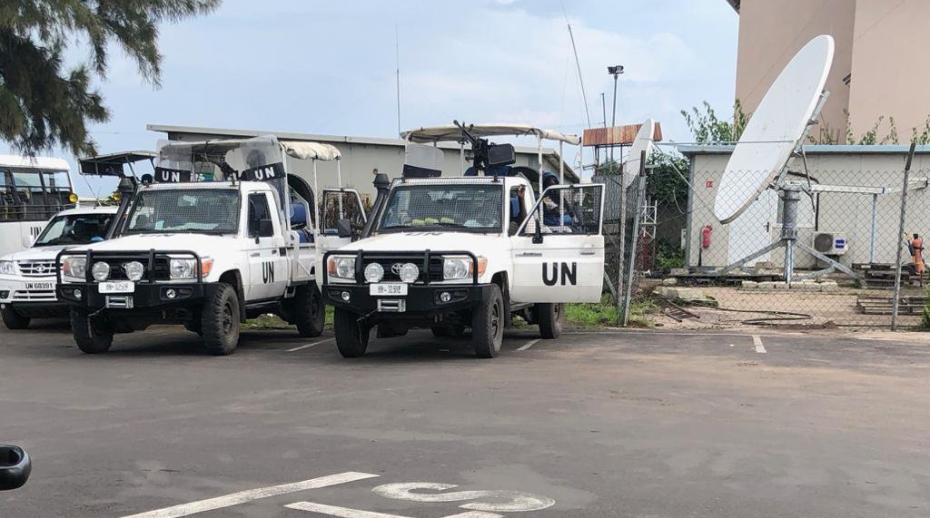
(Stockholm, 12 November 2019) In two days, on 14 November, the mandate of the United Nations Multidimensional Integrated Stabilization Mission in the Central African Republic (MINUSCA) will be renewed, as will the mandate of the United Nations Organization Stabilization Mission in the Democratic Republic of the Congo (MONUSCO), next month. Both operations aim to strengthen the role of the state in the provision of security and justice. This is in line with what populations desire, according to a new series of reports from the Stockholm International Peace Research Institute (SIPRI) and the Catholic Organization for Relief and Development Aid (Cordaid) on securing legitimate stability in the Central African Republic (CAR) and the Democratic Republic of the Congo (DRC).
The dominant assumption in the international development policy discourse is that strengthening a state’s capacity to provide inclusive security and justice will lead to a stronger social contract. However, this approach is frequently criticized by civil society and academics. Therefore, during—and often also after—conflict, a lot of attention is also given to strengthening non-state and informal justice and security provisions.
Studying the examples of CAR and the DRC, the reports looked at the aims and objectives of the external intervenors (MINUSCA and MONUSCO) through reviewing their policy documents and literature and by interviewing key representatives.
The research compared this with the aspirations of local populations. It found that local populations are supportive of strengthening the state’s long-term role and legitimacy in justice and security provisions. They perceive non-state, informal justice and security solutions only as temporary alternatives.
‘We were really surprised since in policy and academic debates, the mismatches between external intervenors and local populations are frequently highlighted. However, on the basis of this research, in CAR and South Kivu, DRC, this criticism may have to be readjusted,’ says Dr Jair van der Lijn, Programme Director at SIPRI, and one of the authors of the reports.
Perspectives from the ground were gathered from a total of 480 street interviews in different localities in CAR and South Kivu province, and some 70 interviews with key representatives from among other groups public authorities, civil society representatives and the leadership of armed groups.
The state remains the central security actor
The research shows that despite its poor record, the state remains central to popular aspirations in both CAR and South Kivu, DRC. In both cases, respondents characterized their ideal state as ‘strong’, ‘decentralized’ and ‘accountable’.
Non-state actors were not considered a long-term alternative to the state. Even in the short term, respondents in both CAR and South Kivu province see the return of the current less-inclusive state as the lesser of two evils.
The Khartoum Agreement in CAR—diverging views on the role of rebels
One discrepancy the study raised was the role of the rebels in the future of the state in CAR. The 2019 Khartoum Agreement was signed between the Government of CAR and 14 armed groups and is a central part of MINUSCA’s mandate. The agreement co-opts the leaders of armed groups into the state and recognizes them as representatives of the disenfranchised population.
However, even in rebel-held areas respondents do not see the armed groups as representative of the disenfranchised population. They want them to disarm and leave, and to be prosecuted. MINUSCA’s cooperation with the rebel groups has led to frequent unsubstantiated accusations that MINUSCA is arming and providing support to rebels. The research revealed that on the ground, respondents perceive these accusations as very real.
‘For accountability and to ensure popular support, external intervenors should communicate directly with local communities, not rely only on community representatives,’ says Nikki de Zwaan, Senior Security & Access to Justice Expert at Cordaid. ‘This means that external intervenors need to be more aware of who their counterparts are.’
Both countries differ in who should provide security and justice
Justice provision is perceived differently in CAR and the DRC. In CAR, respondents expect the national armed forces to be involved in resolving disputes. Only a few respondents talked about non-military forms of justice provision. In South Kivu province, the environment is less militarized as respondents, particularly in urban areas, described a formal justice system in which the police play a major role.
There is a risk attached to popular support for the armed forces combined with international interest in further strengthening them and the evident self-interest of the armed forces themselves. In CAR, external support for the most popular security provider may increase its effectiveness and popularity, leading to a vicious circle of short-term, militarized security solutions.
For editors
The research for this study was done in cooperation with the Catholic Organization for Relief and Development Aid (Cordaid), a development and humanitarian organization, working to end poverty and exclusion. Financial support for this project was received from NWO-WOTRO—commissioned by the Ministry of Foreign Affairs of The Netherlands and developed in close collaboration with the Knowledge Platform Security & Rule of Law.
Watch the Spotlight interviews on SIPRI's YouTube channel.